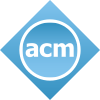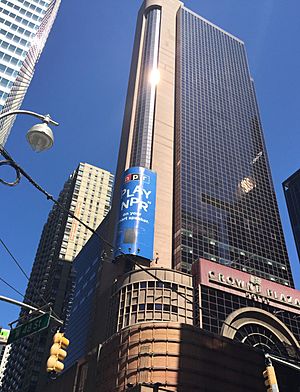Association for Computing Machinery facts for kids
The Association for Computing Machinery (ACM) is a big international group for people interested in computing. It's based in the USA. Founded in 1947, it's the world's largest group for computer science and education.
ACM is a non-profit group. This means it uses its money to help its members and achieve its goals, not to make a profit. It has about 110,000 student and professional members. Its main office is in New York City.
ACM brings together people who love computer science (also called informatics). Its main goal is "Advancing Computing as a Science & Profession." This means they want to help computing grow as a field of study and a job.
Contents
History of ACM
How ACM Started
In 1947, some smart people realized they needed a way to talk to each other about computers. Professor Samuel H. Caldwell from MIT suggested creating a group. He saw a need for people working with computing machines to share ideas.
A temporary committee was formed to start this group. These people had worked with computers during World War II. For example, some helped build early computers like the Harvard Mark I and ENIAC. Others worked on secret code-breaking machines. They all understood how important computers were becoming.
ACM's Early Days
The group was first called the Eastern Association for Computing Machinery. But just one year later, in 1948, they changed the name to the Association for Computing Machinery. This new name showed that they wanted to be a group for everyone interested in computing, not just those in the East.
Since 2016, the ACM has been collecting stories about computer history. They have projects like the A.M. Turing Oral History project. They also have video series about important award winners and industry leaders.
What ACM Does
ACM has many ways for people to get involved. It has over 180 local groups for professionals. It also has 38 Special Interest Groups (SIGs). These SIGs are like clubs for people who are really into specific computer topics. There are also more than 680 student groups. The very first student group started in 1961 at the University of Louisiana at Lafayette.
Conferences and Events
Many of the SIGs hold regular conferences. These are big meetings where people share new ideas and discoveries in computing. Some famous SIGs include SIGGRAPH (for computer graphics) and SIGCSE (for computer science education). These conferences are important places to learn about the latest innovations.
ACM also supports other cool computer-related events. One big event is the worldwide ACM International Collegiate Programming Contest (ICPC). This is a competition where college students solve difficult computer programming problems. ACM even sponsored a famous chess match between Garry Kasparov and the IBM Deep Blue computer!
ACM Services
Publications and Magazines
ACM publishes many different things to share knowledge about computing. They have over 50 journals, which are like academic magazines. One of their most famous journals is the Journal of the ACM. They also have two general magazines for computer professionals: Communications of the ACM and Queue.
Other publications include:
- ACM XRDS: This is a popular computing magazine for students in the US.
- ACM Interactions: This magazine looks at how people, technology, and experiences connect.
- ACM Computing Surveys (CSUR): This publication reviews different areas of computing.
ACM also publishes many journals called ACM Transactions. These journals focus on specific parts of computer science. For example, there are journals about algorithms, computer systems, and computer graphics.
Online Resources: The Digital Library
The ACM Portal is an online service from ACM. It has two main parts: the ACM Digital Library and the ACM Guide to Computing Literature.
The ACM Digital Library started in 1997. It's a huge collection of all the articles ACM has ever published. This includes articles from their journals, magazines, and conference papers. The Guide is a massive list of over one million computing-related entries. The Digital Library has an archive going all the way back to the 1950s.
The Digital Library also has a forum called Ubiquity and a Tech News digest. It's a great place to find information about computing. ACM has been working to make its publications more accessible. Since April 7, 2022, all ACM publications from 1951 to 2000 have been made free to access online.
ACM is also working to become a fully Open Access publisher by 2026. This means more of their research will be free for everyone to read.
Membership and Recognition
ACM has different levels of membership. These levels recognize members who have been part of the group for many years and have done amazing things in computing.
ACM Fellows
The ACM Fellows Program started in 1993. It honors ACM members who have made huge contributions to computer science and information technology. As of 2020, there are 1,310 Fellows out of about 100,000 members. This shows how special this recognition is.
Distinguished Members
In 2006, ACM started recognizing "Distinguished Members." These are people who have worked in computing for at least 15 years. They must also have been ACM members for 5 years and have made a big impact on the computing field.
Senior Members
Also in 2006, ACM began recognizing "Senior Members." These members have at least 10 years of professional experience. They also need 5 years of continuous ACM membership. This award recognizes their leadership and contributions to the field.
ACM Chapters
ACM has three types of chapters:
- Special Interest Groups (SIGs): These are groups focused on specific areas of computing.
- Professional Chapters: These are local groups for professionals.
- Student Chapters: These are groups for students.
As of 2022, ACM has professional and SIG Chapters in 56 countries. There are also ACM student chapters in 41 countries.
Special Interest Groups (SIGs) List
Here are some of the many Special Interest Groups within ACM:
- SIGACCESS: Focuses on making computing accessible for everyone.
- SIGACT: Deals with algorithms and computation theory.
- SIGAI: For people interested in Artificial Intelligence.
- SIGARCH: Focuses on computer architecture (how computers are built).
- SIGCHI: Explores how humans and computers interact.
- SIGCOMM: About data communication and networks.
- SIGCSE: Dedicated to computer science education.
- SIGGRAPH: For computer graphics and interactive techniques.
- SIGIR: Focuses on finding information.
- SIGKDD: About discovering knowledge from data.
- SIGMOD: Deals with managing data.
- SIGOPS: For operating systems (like Windows or macOS).
- SIGPLAN: Focuses on programming languages.
- SIGSOFT: About software engineering (how to build software).
ACM Conferences
ACM and its Special Interest Groups (SIGs) host many conferences around the world. Most SIGs have an annual conference. These conferences are very popular places to share new research and ideas. It can be quite competitive to get a paper accepted at an ACM conference.
For example, SIGGRAPH 2007 had about 30,000 people attend! Other conferences, like CIKM 2005 and RecSys 2022, only accepted a small percentage of the papers submitted.
Some well-known ACM conferences include:
- AIES: Conference on AI, Ethics, and Society
- CHI: Conference on Human Factors in Computing Systems
- SIGCOMM: ACM SIGCOMM Conference
- SIGCSE: SIGCSE Technical Symposium on Computer Science Education
- SIGGRAPH: International Conference on Computer Graphics and Interactive Techniques
- RecSys: ACM Conference on Recommender Systems
ACM is also a founding partner of the Grace Hopper Celebration of Women in Computing (GHC). This event celebrates women in the field of computing.
Awards from ACM
ACM gives out many awards to recognize people who have done amazing things in computer science and information technology.
Some of the major awards include:
- ACM A. M. Turing Award: This is often called the "Nobel Prize of computing."
- ACM Grace Murray Hopper Award: Given to young computer professionals.
- ACM Prize in Computing: Recognizes groundbreaking contributions.
- ACM Software System Award: Honors important software systems.
- ACM Student Research Competition: Encourages student research.
Many of ACM's Special Interest Groups also give awards to individuals for their contributions.
Leadership
The current President of ACM for 2022–2024 is Yannis Ioannidis. He is a Professor at the National and Kapodistrian University of Athens. Past presidents include Gabriele Kotsis, Cherri M. Pancake, and Vicki L. Hanson. Famous computer scientist and Internet pioneer Vint Cerf was also a president from 2012–2014.
ACM is led by a group called the Council. This group includes the president, vice-president, treasurer, and other important leaders from different parts of ACM.
ACM Council on Women in Computing (ACM-W)
ACM-W is a special group within ACM that supports women in computing. They celebrate and speak up for women's full involvement in the field around the world.
ACM-W's main programs include:
- Regional celebrations of women in computing.
- ACM-W chapters (local groups).
- Scholarships for women computer science students to attend research conferences.
ACM-W also works with other organizations that support women in technology. They give an annual Athena Lecturer Award. This award honors outstanding women researchers who have made important contributions to computer science.
Partner Organizations
ACM often works with other groups. Its main partner is the IEEE Computer Society (IEEE-CS). This group is part of the Institute of Electrical and Electronics Engineers (IEEE). While IEEE focuses more on computer hardware, ACM and IEEE-CS have many joint activities. They work together on conferences, publications, and awards. For example, the Eckert–Mauchly Award and Ken Kennedy Award are given jointly by ACM and the IEEE-CS.
ACM also partners with other professional groups, like the Society for Industrial and Applied Mathematics (SIAM).
See also
 In Spanish: Association for Computing Machinery para niños
In Spanish: Association for Computing Machinery para niños
- Computer science
- Computing
- Turing Award
- Fellows of the ACM
- Grace Murray Hopper Award
 | William L. Dawson |
 | W. E. B. Du Bois |
 | Harry Belafonte |



